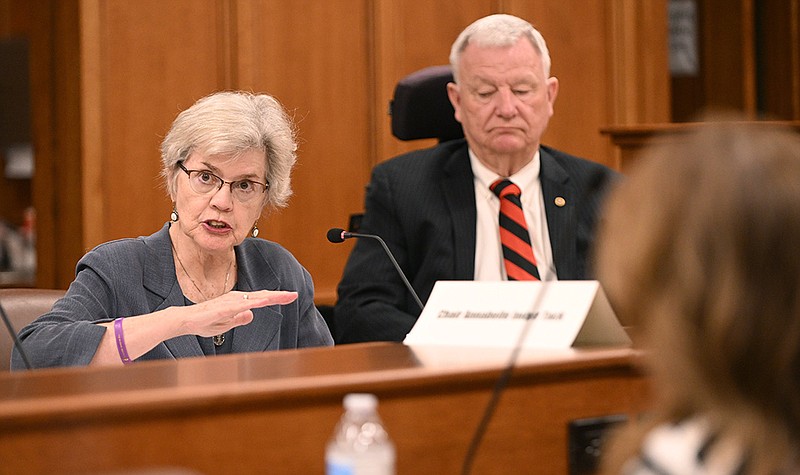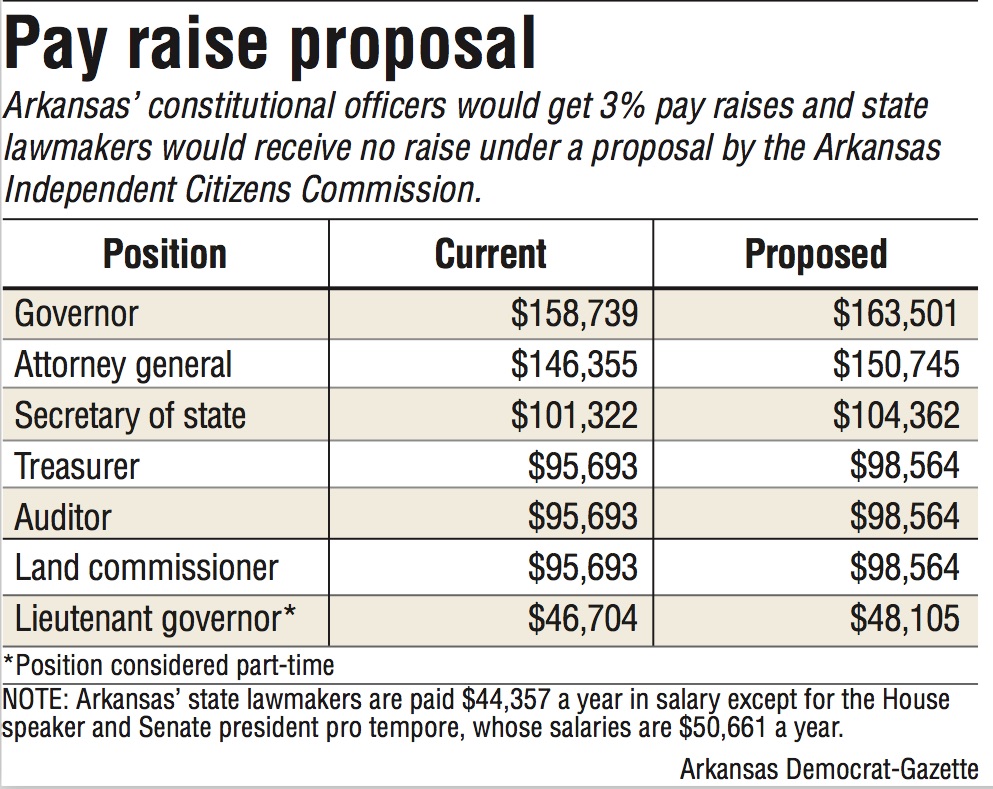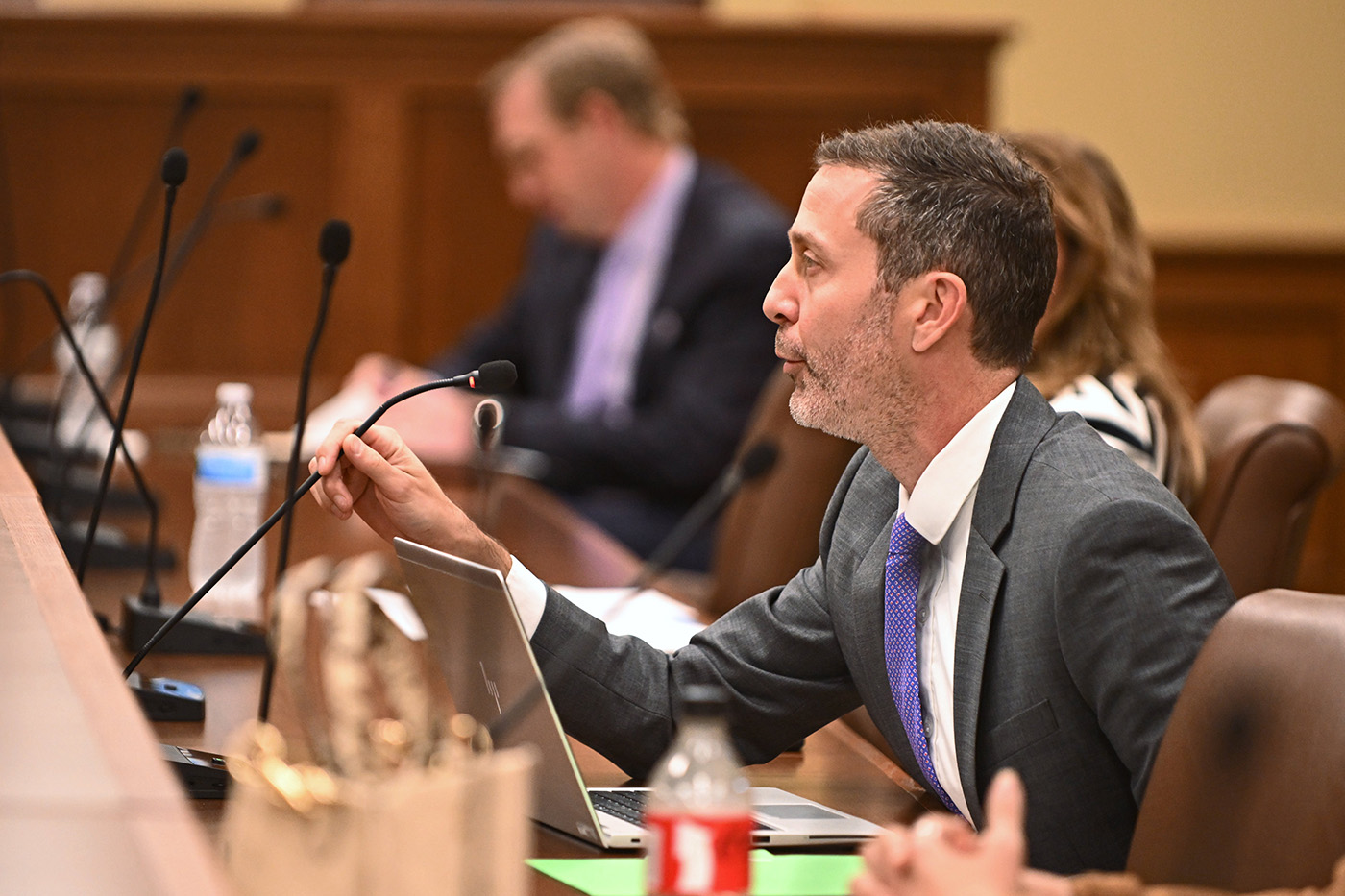Arkansas' constitutional officers would get 3% pay raises and state lawmakers would receive no raise under a proposal of the state's commission that sets the salaries of the state's elected officials.
The Arkansas Independent Citizens Commission voted Friday to approve a motion by Commissioner Tommy May to make the proposal, with Commissioner Phillip Fletcher absent. Besides May, the other commissioners are Chair Annabelle Imber Tuck, Frank Guinn, Jonathan Rogers, Clark Smith and Jan Zimmerman.
After accepting public comment on the proposal, the commission plans to reconvene June 16 to consider taking final action. If the commission approves the proposal, it would become effective 10 days after the resolution for the proposal is filed with the state auditor's office.
The proposed 3% raises would increase the annual salary of Arkansas' governor from $158,739 to $163,501 a year and the attorney general from $146,355 to $150,745 a year, according to the proposed salary adjustment resolution. The 3% raises also would increase the pay of the secretary of state from $101,322 to $104,362 a year, and the pay of the treasurer, auditor and land commissioner from $95,693 to $98,564 a year. The salary of lieutenant governor, which is considered part time, would increase from $46,704 to $48,105 a year.
Arkansas' state lawmakers are paid a salary of $44,357 a year except for the House speaker and Senate president pro tempore, whose salaries are $50,661 a year.
May said Arkansas legislators' salaries rank third among 10 Southern states, based on a report compiled by the state auditor's office and "there are other [expense] payments that go with that.
"We know the constitutional officers are full time [and] we know that they have the same challenges as we do relative to inflation and all of those things," he said.
"I personally would be willing to recommend a 3% increase for the constitutional officers and hold steady on the legislative salaries," May said.
Rogers said he would be happy to support May's proposal to grant a cost-of-living adjustment to the state's constitutional officers.
Tuck said "when we are looking at these rankings [of legislative salaries], to be honest with you, we know Arkansas [and] they get per diem."
State lawmakers in Arkansas are paid per diem and reimbursed for mileage during legislative sessions and for attending legislative meetings outside of legislative sessions. Over the past 15 years or so, the state has made the largest expense payments to state lawmakers who attended the most legislative meetings between sessions, who lived the farthest from Little Rock and/or attended the most out-of-state conferences.
Tuck said "I don't know what these other states get other than I know that they get some office expense, some of them.
"Saying we are ranked in a certain place, I am just not sure what that means because I have no idea what other sources of income" are provided by other states to their state lawmakers, she said.
Tuck, a former state Supreme Court justice, said "I am not saying I am opposed to what is being discussed." However, "the legislative salaries side of this is so apples and oranges, and I don't know how to compare states, if you want to know the truth about it," she said.
T.J. Fowler, legal counsel for the state auditor, told the commission that each state has its own set of per diem rules for state lawmakers based on his research of salaries for state lawmakers.
"While you can rank the actual salaries here and it appears Arkansas is [near] the top, I can't say that is an accurate reflection of total compensation," he said.
May said it's important for the state not to lose ground in compensating the state's constitutional officers.
SALARY COMPARISONS
Arkansas lawmakers' annual salaries lag only Alabama's $53,965-a-year salary and Oklahoma's $47,500-a-year salary among the 10 states in the auditor's comparison. In other surrounding states, the annual salary for state lawmakers is $16,800 a year in Louisiana, $23,500 a year in Mississippi, $36,813 a year in Missouri, $24,316 a year in Tennessee and $7,200 a year in Texas.
The reports shows the salary for Arkansas' governor ranks third among 10 Southern states, the salary for Arkansas' attorney general ranks fifth among these states, the salary for Arkansas' secretary of state ranks eighth among these states and the salary for Arkansas' lieutenant governor ranks ninth among these states.
Arkansas' governor's salary lags Tennessee governor's salary of $213,708 a year and Georgia governor's salary of $175,000 a year among the 10 southern states, according to the state auditor office's report. Among other surrounding states, the report shows the salary for Louisiana's governor is $130,000 a year, the Mississippi governor's is $122,160 a year, the Missouri governor's is $137,027a year, the Oklahoma governor's is $158,037 a year, and the Texas governor's is $153,750 a year.
On Jan. 20, the Arkansas Independent Citizens Commission initially proposed 6% pay raises for the state's constitutional officers and state lawmakers.
Shortly thereafter, Republican Gov. Sarah Huckabee Sanders said she would donate to charity any pay raise she receives as part of potential pay hike for state elected officials, and Republican Attorney General Tim Griffin said he regularly donates "in excess of my pay raise" to his church and charities.
The commission voted Feb. 17 to delay consideration of pay raises for the state's constitutional officers and state lawmakers until Friday. The commission's action came after it received letters signed by a total of 49 members to salary increases for state lawmakers, who cited budgetary needs and the impacts on inflation on Arkansas' workers and families as reasons why legislative pay raises weren't currently justified.
At that time, Tuck said "we do not have sufficient information to make the evidence-based decisions we made in the past" and the regular session had kept the Bureau of Legislative Research from compiling a report for the commission on lawmakers' pay outside of Arkansas.
The Arkansas General Assembly's regular session adjourned May 1.
In November, the Arkansas Independent Citizens Commission approved a 2% cost-of-living adjustment and a 5% salary increase for state Supreme Court, appellate, circuit and district judges and prosecuting attorneys.
The commission approved the pay raises after officials representing judges and prosecutors asked for increased salaries to keep up with rising inflation. The salary increases took effect Nov. 28.
The raises granted by the commission in November boosted the salaries of the chief justice of the Arkansas Supreme Court to $219,902 a year, Supreme Court associate justices to $203,625 a year, the Court of Appeals chief to $200,610 a year, Court of Appeals judges to $197,596 a year, circuit judges to $192,918 a year, district judges to $168,803 a year, full-time prosecuting attorneys to $183,272 a year, and part-time prosecuting attorneys to $155,781 a year.
The Independent Citizens Commission was created under Constitutional Amendment 94, approved by voters in November 2014.
Amendment 94 also loosened term limits for state lawmakers, prohibited corporate and union campaign contributions to candidates, and barred lobbyists from providing certain gifts, such as meals and drinks in one-on-one meetings, to lawmakers.
Along with setting salaries for constitutional officers and lawmakers, the commission is tasked with determining salaries for the state's judges and prosecutors. Members of the commission are appointed by the governor, state Supreme Court chief justice, House speaker and Senate president pro tempore.
In January, state Rep. David Ray, R-Maumelle, filed a proposed constitutional amendment to dissolve the independent commission and return the authority for setting salaries of the state's elected officials to the Legislature. The Legislature didn't refer the proposal for voters to consider in the 2024 general election.


